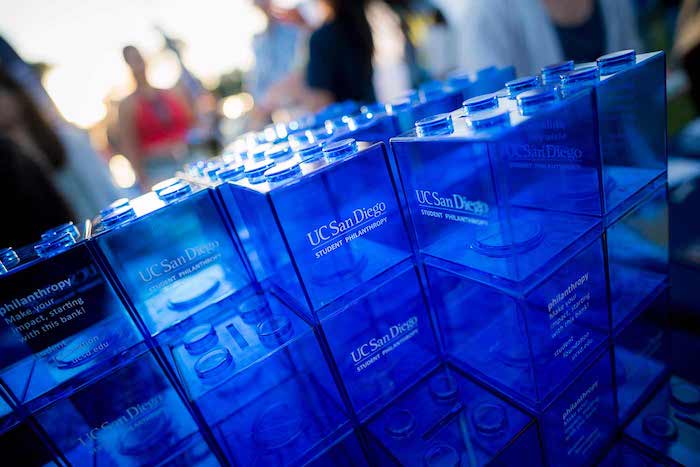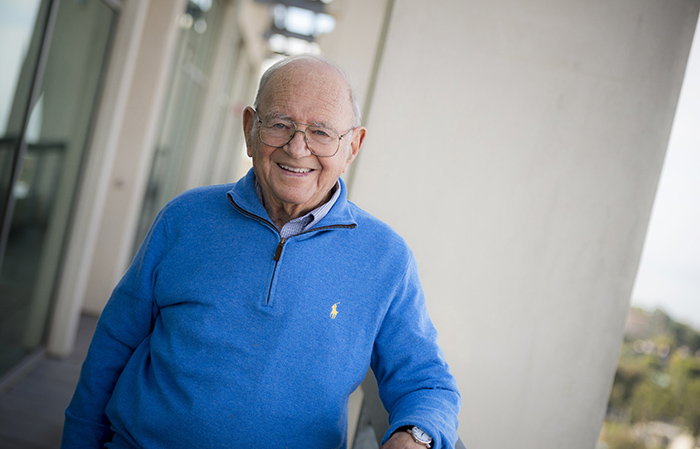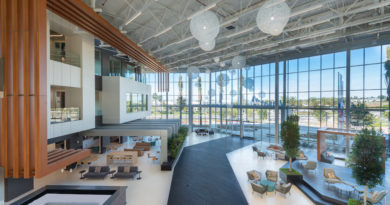Daily Business Report-Sept. 29, 2017
Under the proposed initiative, SDCCU Stadium in Mission Valley would be sold to SDSU to develop a comprehensive plan for the acreage, including a joint-use stadium for SDSU football.
‘Friends of SDSU’ Seeks Ballot Initiative
Asking Voters to Approve Sale of
SDCCU Stadium to the University
A group called Friends of SDSU announced a ballot initiative drive on Thursday to ask voters to approve the sale of the SDCCU Stadium site to the university for the preparation of a comprehensive plan for the Mission Valley acreage.
The initiative was dubbed the “SDSU West Campus Research Center, Stadium, and River Park Initiative.”
“We are proud to formally introduce our initiative, which is centered around our shared goal of helping SDSU grow, prosper and continue to meet our regional higher education needs,” said Malin Burnham, member of the Friends of SDSU Steering Committee. “As one of the last remaining pieces of land in the heart of our city, the stadium site in Mission Valley represents a significant opportunity to create an innovation center and a permanent home for SDSU football.”
The group noted that SDSU has been challenged by a lack of space for expansion, and the city’s decision to shutter SDCCU Stadium in late 2018 has raised questions regarding the future of the SDSU football program.
“For well over a century, the fates of San Diego and SDSU have been inextricably linked,” said former SDSU President Elliot Hirshman. “One in seven adults with college degrees in San Diego are graduates of SDSU. But each year, the university is forced to turn away thousands of promising students due to a lack of space. SDSU needs the facilities to attract top students and researchers from across the globe and power our knowledge economy.”
The SDSU West initiative requires that SDSU purchase the site at fair market value. The initiative also requires a full environmental review under the California Environmental Quality Act (CEQA) including an Environmental Impact Report (EIR).
“The SDSU West initiative requires a public plan, developed through an open and transparent process,” said steering committee member Kim Kilkenny. “Friends of SDSU is proud to provide an alternative plan for the existing stadium site in Mission Valley that better meets the needs of all San Diegans.”
The initiative requires SDSU to comprehensively plan the existing stadium site to provide facilities for educational, research, entrepreneurial and technology programs within a vibrant mixed-use campus village and research park. The initiative also requires revitalization and restoration of the San Diego River Park south of the site as 34 acres of public park land, including walking and biking trails, a river buffer of native vegetation, and requires River Park improvements be made at no cost to the City’s General Fund.
The SDSU West initiative also requires SDSU to construct a joint use stadium for SDSU football at no cost to the city of San Diego. The city would not be required to pay for any stadium rehabilitation costs, demolition or removal costs, cost overruns, operating costs, maintenance, or capital improvement expenses. SDSU West also allows for inclusion of other potential sports partners, including but not limited to professional, premier, or MLS soccer and adaptable for the NFL.
This Saturday, a notice of intent will be published, which begins a 21-day noticing period. At the conclusion of this period, a signature gathering effort will begin at to-be-announced locations across the city of San Diego to qualify the initiative to be placed before voters in 2018.
For more, visit http://www.sdsuwest.org.
Click here for the announcement.
__________________

Grand Opening Set for Oct. 4 for
Vive on the Park Luxury Apartments

A grand opening will be staged on Oct. 4 for “Vive on the Park’ luxury residences, part of Sunroad Enterprises’ 40-acre mixed-use community at Spectrum Center in Kearny Mesa.
The seven-story, 302-unit apartment building was designed by architecture firm KTGY. Amenities include an outdoor pool deck and spa, multi-level fitness center, rooftop lounges with built-in barbecues, a variety of semi-private social spaces with fire pits, dining decks and outdoor game rooms, a business center and dry cleaning service on premise.
According to Sunroad Enterprises, more than 20 customized floor plans were individually created to maximize space and volume within each

unit. Studios average at 532 square-feet; one-bedroom units range from 625 to 1,077 square-feet; two-bedroom units go up to 1,538 square-feet’ with a selection of three-bedroom properties averaging in at 1,409 square-feet. The apartments’ upscale furnishings showcase private patios with sweeping views, sizable walk-in closets, and kitchens with top-of-the-line slate appliances and a five-burner gas range.
Sunroad Enterprises is investing $1 million into the development of an adjoining two-acre public park. The project is expected to see completion in Spring of 2018 and will feature a dog park, children’s playground, as well as picnic tables and elevated landscape.
The ribbon cutting is at 5 p.m. at 8725 Ariva Court.
__________________

How Sky-High Housing Costs
Make California the Poorest State
By Matt Levin | CALmatters
California leads the nation once again in a statistic no state wants to boast about.
When the cost of living is factored in, the Golden State has the highest poverty rate in the country. More than 20 percent of its residents struggle to make ends meet, according to recently released Census figures. That’s nearly 8 million people.
Unfortunately for Californians, this year’s poverty numbers are not an aberration. The Census began releasing state-by-state results for its “supplemental poverty measure” in 2011, in an attempt to improve upon the outdated and heavily criticized official poverty statistics.
In the less sophisticated “official” measure, a family of four in San Francisco or Los Angeles or San Diego faces exactly the same poverty threshold —$24,339 annually — as a family in rural Mississippi. That’s despite the fact that you can rent a three-bedroom, two-bathroom 1,200-square-foot house in Horn Lake, Mississippi, for the same price ($850 a month) as half a living room in the Bay Area.
California has been the poorest state in the nation under the vastly more sophisticated “supplemental” poverty measure since the alternative statistic was created (Mississippi is poorest under the old measure). It’s not even really that close: Florida has the second highest rate, at 18.7 percent.
Part of the reason California tops the list year after year is a byproduct of how the supplemental poverty measure is calculated. It’s a three-year moving average, so year-over-year changes can’t swing a state’s poverty rate one way or another all that much.
The Census uses data dating to 2011 to calculate the cost of living, so even the improved poverty rate could be underestimating how big a drain housing has been on California’s poor. The biggest jumps in housing costs—like those we’ve seen in Sacramento and other mid-size California cities in recent years—typically apply to a relatively small percentage of renters finding new apartments. But ask any California renter whether they’d rather be paying 2011 rents or 2017 rents, and they’ll ask you for the keys to the DeLorean as soon as possible.
__________________

UC San Diego Showcases
New Services for Students
With the start of fall quarter on Sept. 28, UC San Diego is unveiling a number of initiatives and programs that will enhance the student experience, including new graduate student housing, degree programs, arcades, eateries and more. In addition, the campus is rolling out new traditions such as Changemaker Day on Oct. 25, which will support student social entrepreneurs to benefit the campus and surrounding communities.
UC San Diego expects to enroll a fall class of nearly 8,600 new students who are academically well prepared, talented, and represent a broad diversity of backgrounds, perspectives and cultures. The incoming freshman class has an overall grade-point average of 4.08, an average SAT score of 1858 and an average ACT score of 29. The new transfer student class has an average grade-point average of 3.46. The new students have declared majors across 41 academic departments in the Arts and Humanities, Social Sciences and STEM fields.
__________________

Peter Frampton Stars at Walden
Family Services’ Wine D’Vine Gala
Tickets are on sale now for Walden Family Services’ 14th annual Wine D’Vine Gala featuring guitarist and rock icon Peter Frampton, presented by Walden champions and music lovers Harley and Maryanne Sefton.
The event will be held Friday, Oct. 13, 6 p.m., at the Hyatt Regency La Jolla at Aventine.
Tickets can be purchased at https://waldenfamily.org/wine-dvine-2017/ for $500 per person for general concert seating or $5,000 for a general concert table of 10. There is a limited number of VIP concert tickets available for $750 per person or $7,500 for a VIP concert table of 10.
Wine D’Vine is Walden’s largest fundraising event of the year and a sell-out crowd is expected. The night will also include a three-course dinner, wine from California’s leading vineyards and a live auction. The event chairs are Caroline and Nicolas Nierenberg and Cheryl and Jeff Smith.
Walden Family Services provides foster and adoptive homes to many children including those with developmental disabilities and special health care needs and prepares and supports youth to successfully transition from foster care to adulthood.
For more information, contact Kathryn Stephens at (619) 727-5897 or kstephens@waldenfamily.org.
__________________

Public Opinion Expert
Daniel Yankelovich Has Died
Nationally renowned public opinion expert Daniel Yankelovich spent more than six decades monitoring social change and public opinion. He also left a legacy of supporting research at the University of California San Diego, aimed at improving how people live. Yankelovich died on Sept. 22 at home in La Jolla. He was 92.
__________________
Marine Corps to Bring Camp Pendleton
Water Systems into Federal Compliance
The Marine Corps has agreed to bring two public water systems at Camp Pendleton into compliance with the federal Safe Drinking Water Act as part of a consent order with the U.S. Environmental Protection Agency. Camp Pendleton’s South and North systems provide drinking water to approximately 55,000 customers.
Camp Pendleton adds disinfectants to its groundwater systems as part of a treatment process that must be supervised and operated by qualified personnel. An EPA inspection in June 2017 found that Camp Pendleton lacked adequate supervision and qualified operators for treatment and distribution at its South and North public water systems.
“Public water systems must meet all state and federal requirements to provide safe drinking water to their customers,” said Alexis Strauss, EPA’s acting regional administrator for the Pacific Southwest. “Our priority is to ensure the base achieves compliance promptly, to serve those who live and work at Camp Pendleton.”
EPA’s investigation found several significant deficiencies at both systems, including the presence of small animal remains in three reservoirs. In addition, EPA found that the advanced water treatment plant had been periodically shut down and that operators were not completing required equipment testing. Finally, inspectors found that operators did not regularly inspect, maintain, and document monitoring efforts, which resulted in foundational cracks and inadequate seals.
Shortly after the EPA inspection, USMC removed the animal remains and cleaned, refilled, and tested the reservoirs for total coliform and chlorine. USMC will conduct additional testing to ensure the water in the reservoirs is safe to drink.
__________________
Cubic Awarded $61M to Update
Air Force P5 Combat Training System
Cubic’s global defense segment has received a potential $61 million contract to update the U.S. Air Force‘s P5 air combat training system.
The sole-source contract includes modifications for the company to help the service branch address emerging government requirements for the P5 system and supporting infrastructure, the Defense Department said.
P5 CTS is designed to train warfighters from U.S. military branches and coalition partners on one common platform.
The system utilizes a long-range datalink to receive and transmit the time, space, position data on aircraft platforms during an exercise as well as deliver kill notifications to aircrew through synthesized voice communications. —ExecutiveBiz
__________________
Pivot Tutors Expands and Relocates

Pivot Tutors, a San Diego-based tutoring company for high school students, has announced expanded and relocated to 11300 Sorrento Valley Road, Suite 101 in San Diego. Founded in 2013, the company has helped 300 students to date. A larger location opening on Monday, Oct. 2, will accommodate the company’s growing team of six tutors and provide seven rooms for one-on-one tutoring sessions.
“We’re focused on teaching students how to teach themselves,” said Shayda Moshirvaziri, CEO of Pivot Tutors. “Our students are usually here because they want to succeed in school or learn a new subject, and the practices they inherit at Pivot Tutors will help them throughout their academic careers. Our new space is critical to the continued success of our company and more importantly, the academic vibrancy of these students.”
Pivot Tutors had been operating out of Hera Hub, a female-focused coworking space in San Diego, and has participated in Hera Labs’ business growth program, SCALE.
“I’m thrilled but not surprised by Pivot Tutors’ rapid growth,” says Silvia Mah, founder of Hera Labs. “Shayda has an incredible vision — backed by action — which is creating new opportunities for her team of tutors and her students across North County.”




